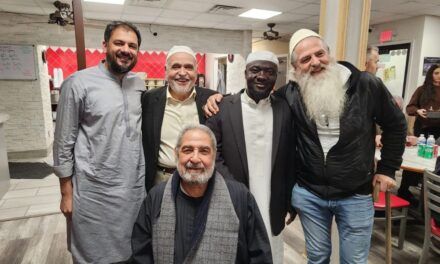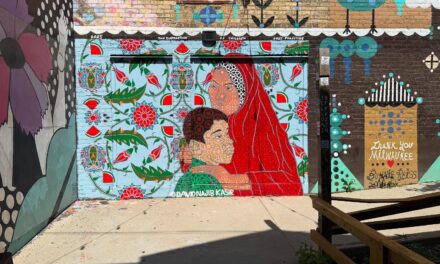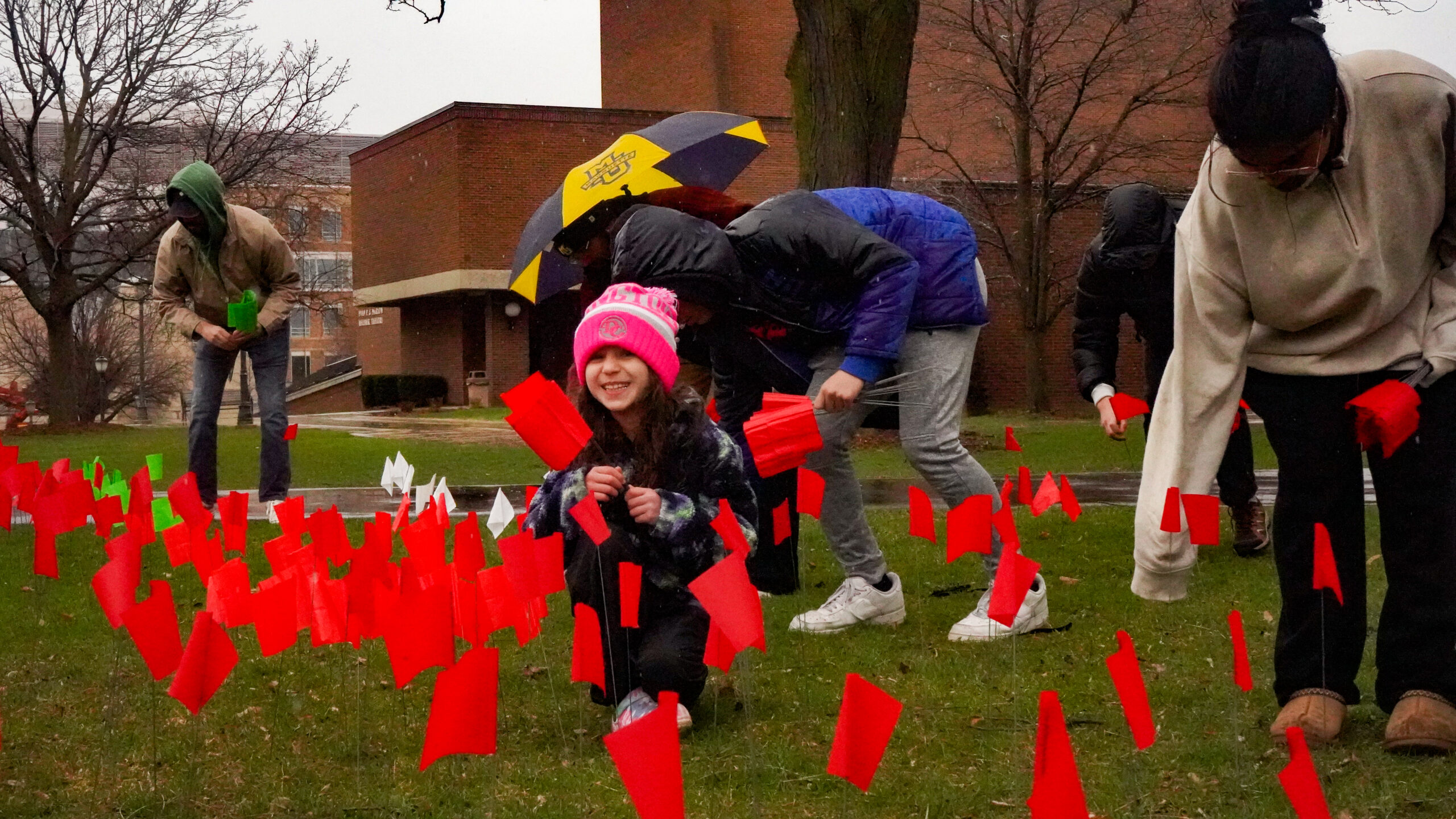
Photos by Kamal Moon
More than 100 people planted flags Sunday on Marquette University’s campus for Palestinians killed in Gaza since Oct. 7.
Marquette University students arrived on campus yesterday to a sea of 41,000 green, red and white flags, each honoring a Palestinian life lost in Gaza since Israel began a military bombardment Oct. 8.
MU students from Students for Justice in Palestine and the Muslim Student Association, and others from the Marquette and Greater Milwaukee communities planted the flags Sunday on MU’s mall, a large green space in the center of campus.
“We’re so used to hearing the numbers (of people killed in Gaza). We hope by making it visual, by placing a flag for each person martyred in Gaza, by people seeing how much it takes of our campus, it will make a difference to people,” SJP president Amani Dalieh told the Wisconsin Muslim Journal as she distributed flags Sunday afternoon.
The importance of raising awareness about what is happening in Gaza is urgent, Dalieh said. “I cannot help but cry for the children of Gaza … With each passing day, I see … a future snatched away before they even had a chance to blossom.”
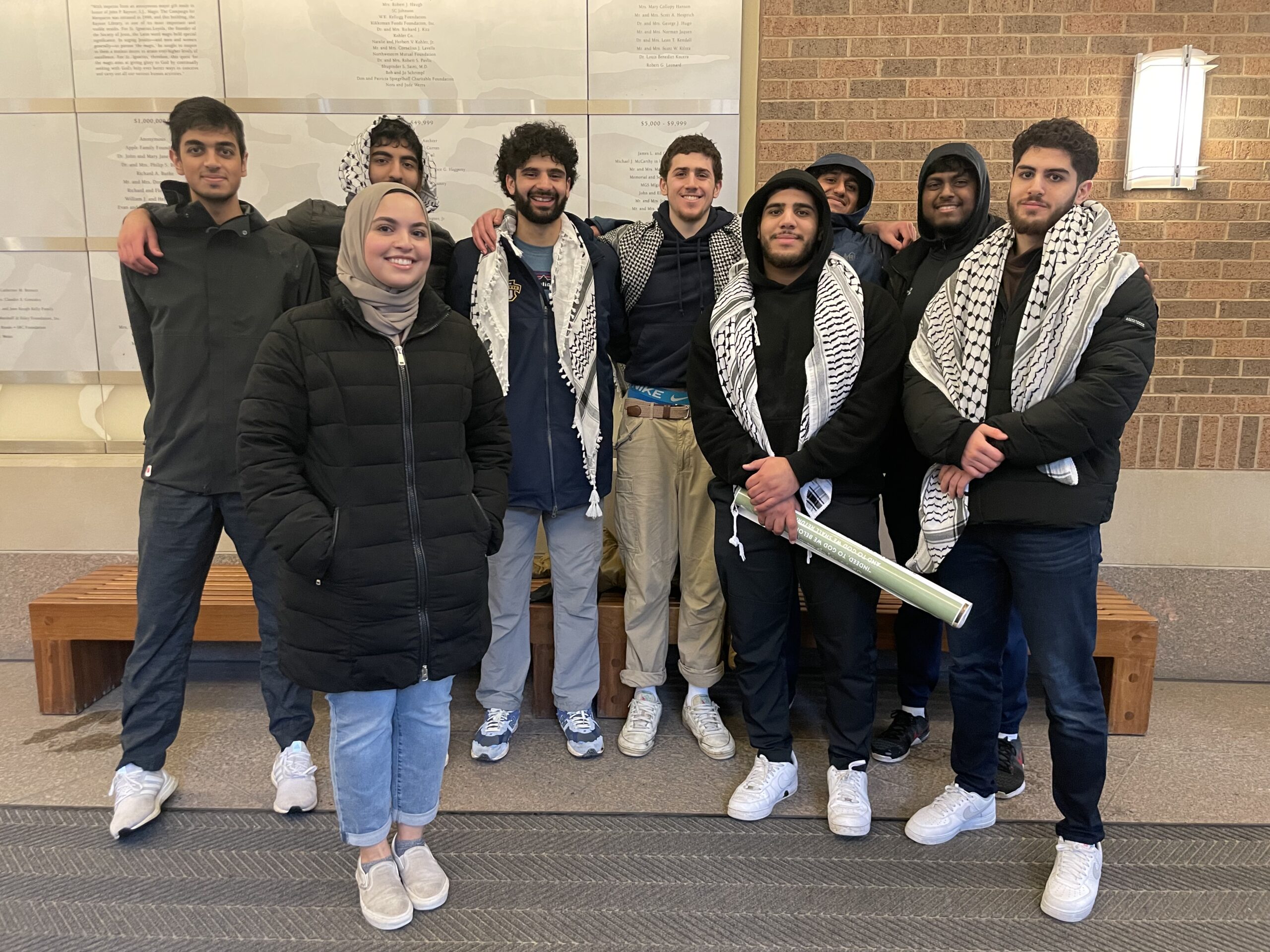
Some Marquette University students who helped with the flag-planting for Palestine event posed for a group shot. Front row, left to right: Zena Khatib, Students for Justice in Palestine vice president; Yazeed Abushanab, Muslim Student Association president; and Yousef Almousa, SJP event coordinator. Back row, left to right: Usman Waheeduddin, Labeeb Awan, Anas Alzamli, Elliot Russell, Luqman Waheeduddin and Emad Khaja.
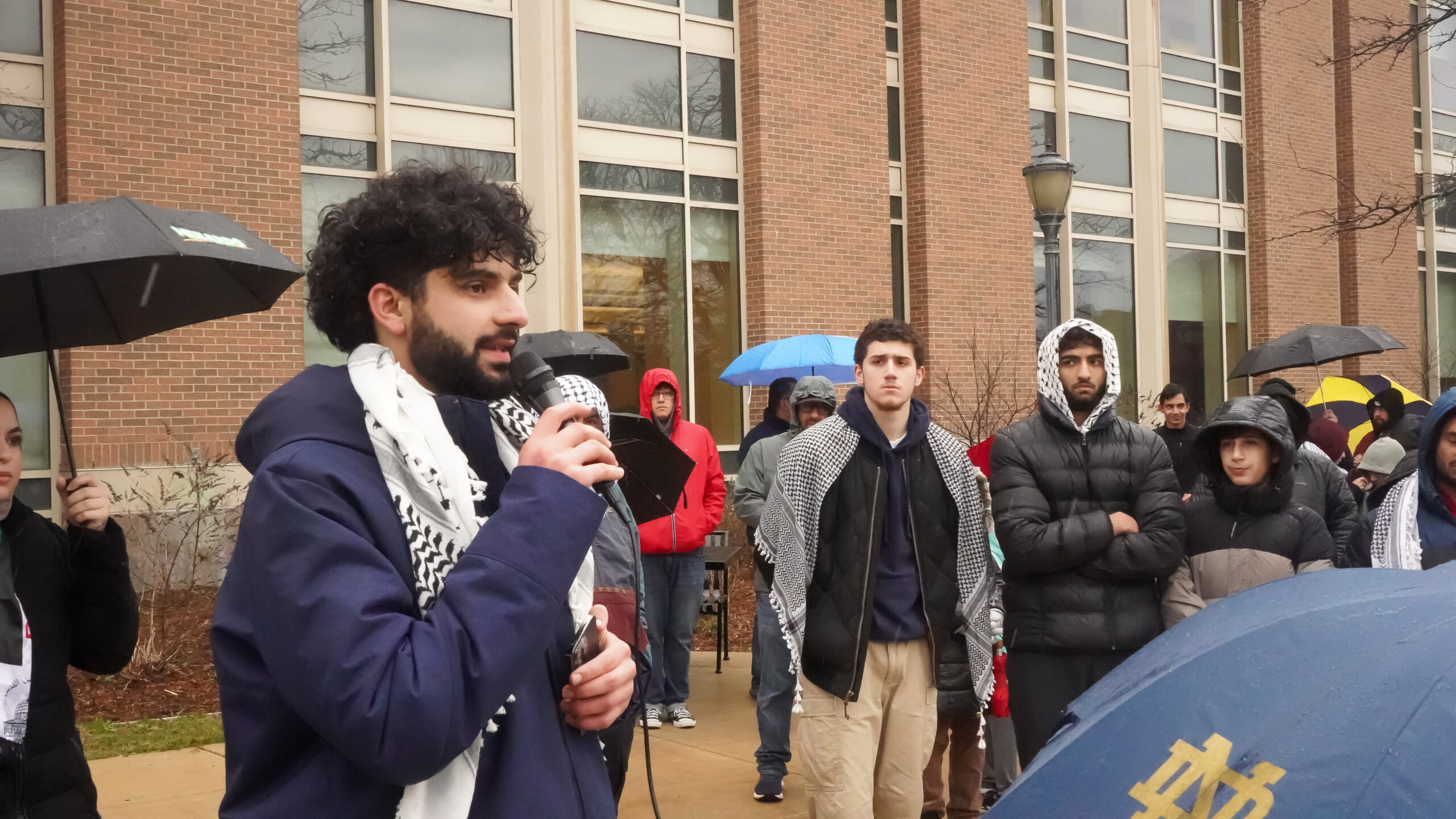
Standing up for Palestinians “can feel very lonely,” said Anas Alzamli, a Palestinian American from Glendale Heights, Illinois, whose family is from Gaza. Choking back tears, he said, “But today we are not alone. We are blessed with a large community from different backgrounds who are here to honor the innocent lives lost.”
Israel’s retaliation for Hamas’ Oct. 7 surprise attack “is one of the most intense civilian punishment campaigns in history,” said University of Chicago political science professor Robert Pape, quoted by the Associated Press. The Palestinian death toll in Gaza from Oct. 7 – April 3 stands at 41,000, according to Euro-Med Human Rights Monitor. It includes 15,370 children, 9,671 women and 37,676 civilians.
(Gaza’s Health Ministry puts the official numbers at more than 33,200 killed and 76,000 wounded, with two-thirds being women and children. That number is widely viewed as incomplete. “Thousands remain unaccounted for — either missing under the rubble, buried hastily in side streets or decomposing in areas that can’t be safely reached,” NPR reported. Also, it “relies on a combination of accurate death counts from hospitals that are still partially operating, and on estimates from media reports to assess deaths in the north of Gaza, where Israeli forces control access.”
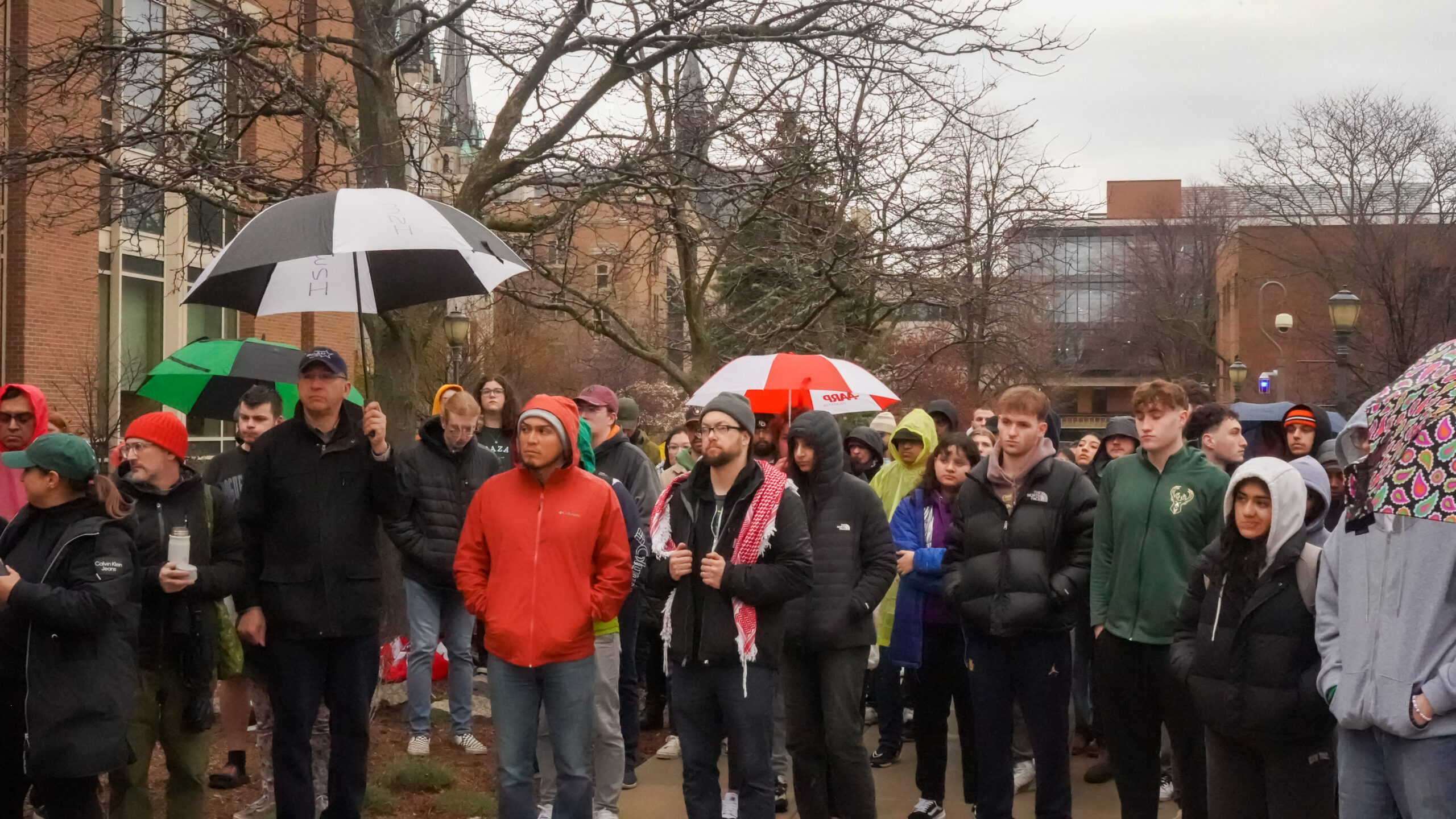
People of all ages and diverse backgrounds joined the Marquette University students to honor Palestinians who were killed in Gaza.
Yet, as the international community calls for a ceasefire, in a video statement yesterday, Israeli Prime Minister Benjamin Netanyahu escalated his pledge to invade the southern Gaza city of Rafah, which is filled with around 1.4 million Palestinians, most of whom are displaced from other parts of the Gaza Strip, AP reported. The Israeli government says it aims to destroy Hamas following its Oct. 7 attack, in which 1,200 people were killed and 240 others were taken hostage.
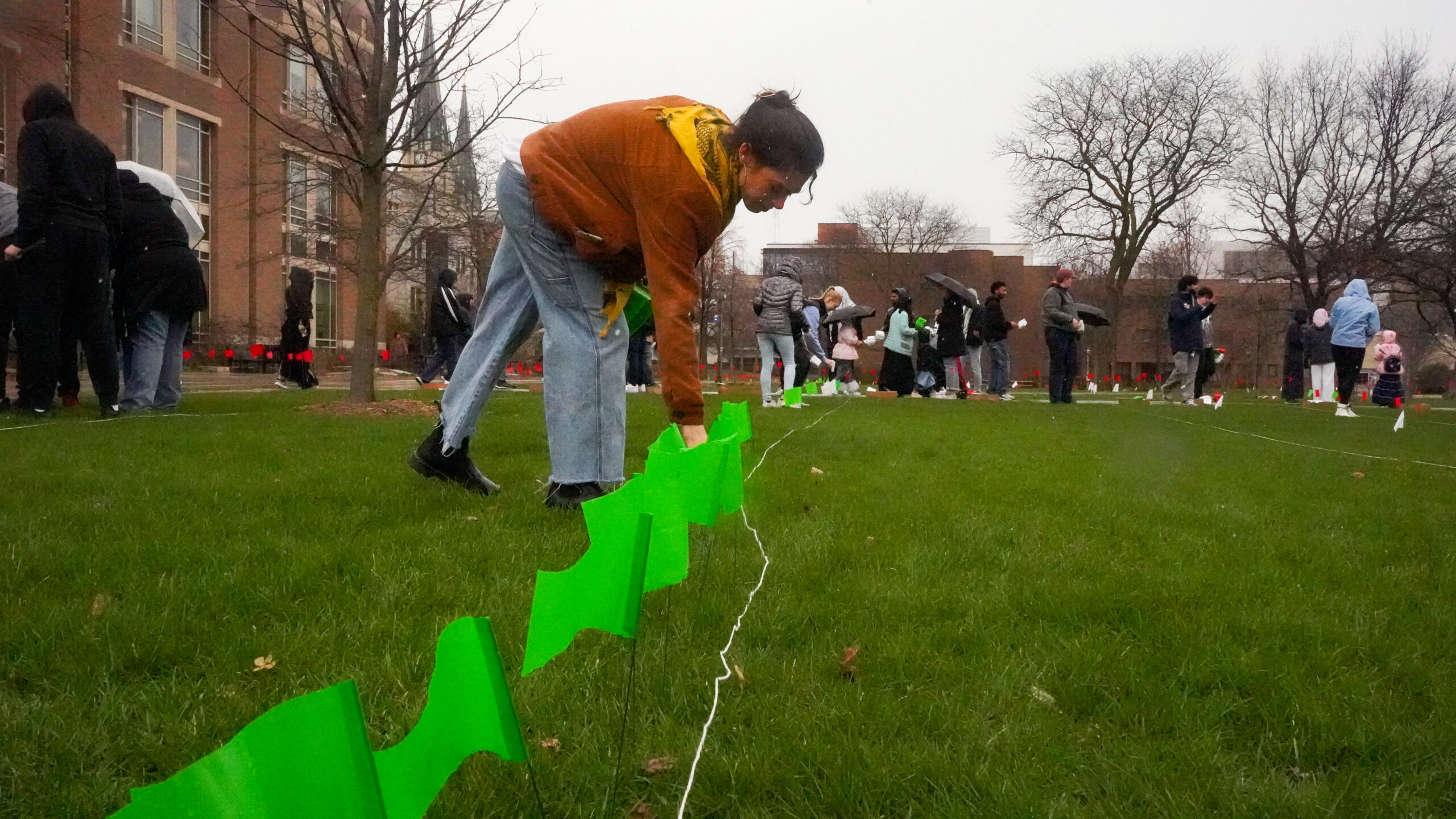
Students and community members planted flags Sunday in cold, wet weather to honor Palestinians who lost their lives in Gaza since Oct. 7.
Planning for this day has been months in the works. SJP dedicates a week in April annually to remember Palestinians living in an unjust situation, former MSA president and current SJP outreach coordinator Leen Mortada said. This year the students wanted to use the week to raise awareness of the killing of Palestinian civilians in Gaza. As commemorations related to Gaza on university campuses across the country became a very sensitive issue, many discussions took place before plans moved forward.
“We hit a few bumps, Dalieh said. “But it all worked out.”
“Earlier this semester, several student organizations discussed a potential flag display as a multi-organization memorial to memorialize and mourn those who lost their lives in the Israel-Hamas war. In recent weeks, Students for Justice in Palestine elected to proceed as the sole student organization sponsoring a memorial and followed the student organization event process for approval,” explained MU Chief Marketing and Communication Officer Lynn C. Griffith. “During the process, university leaders engaged with the Jewish-affiliated minister and the Muslim chaplain.”
The flag-planting event Sunday launched “All Eyes on Gaza,” a week of activities organized by MU’s SJP. SJP board members held a poetry reading on the mall yesterday, reading poems by Palestinian authors. Upcoming events, all held at MU’s Central Mall and open to the general public, include:
- Making and flying kites: Tuesday, 11 a.m. – 4 p.m. Inspired by the Afghan movement “Fly Kites, Not Drones”
“The significance of this activity is to bring back a time where children were not afraid of the skies, as they would look up and enjoy their youth, and understand how this has been ruined by the bombs dropped by planes in Gaza,” explained Mortada. - Visitation to honor the memory of lives lost; Wednesday, all day People are invited to visit the flag display to honor and make prayers for the lives lost in Gaza.
- Rock piling and letter writing: Thursday, 3 – 5 p.m. The rock-piling activity “is a way to honor those still under rubble in Gaza,” Mortada said. The letter writing “is a way for people to grieve and write something they wished to say to those in Palestine.”
- Bake sale and Gaza Before/After Event, 2 p.m.
WMJ attended the flag-planting ceremony Sunday—observing, interviewing participants and listening to speeches made by student leaders. The rest of this story reports on what we heard and saw.
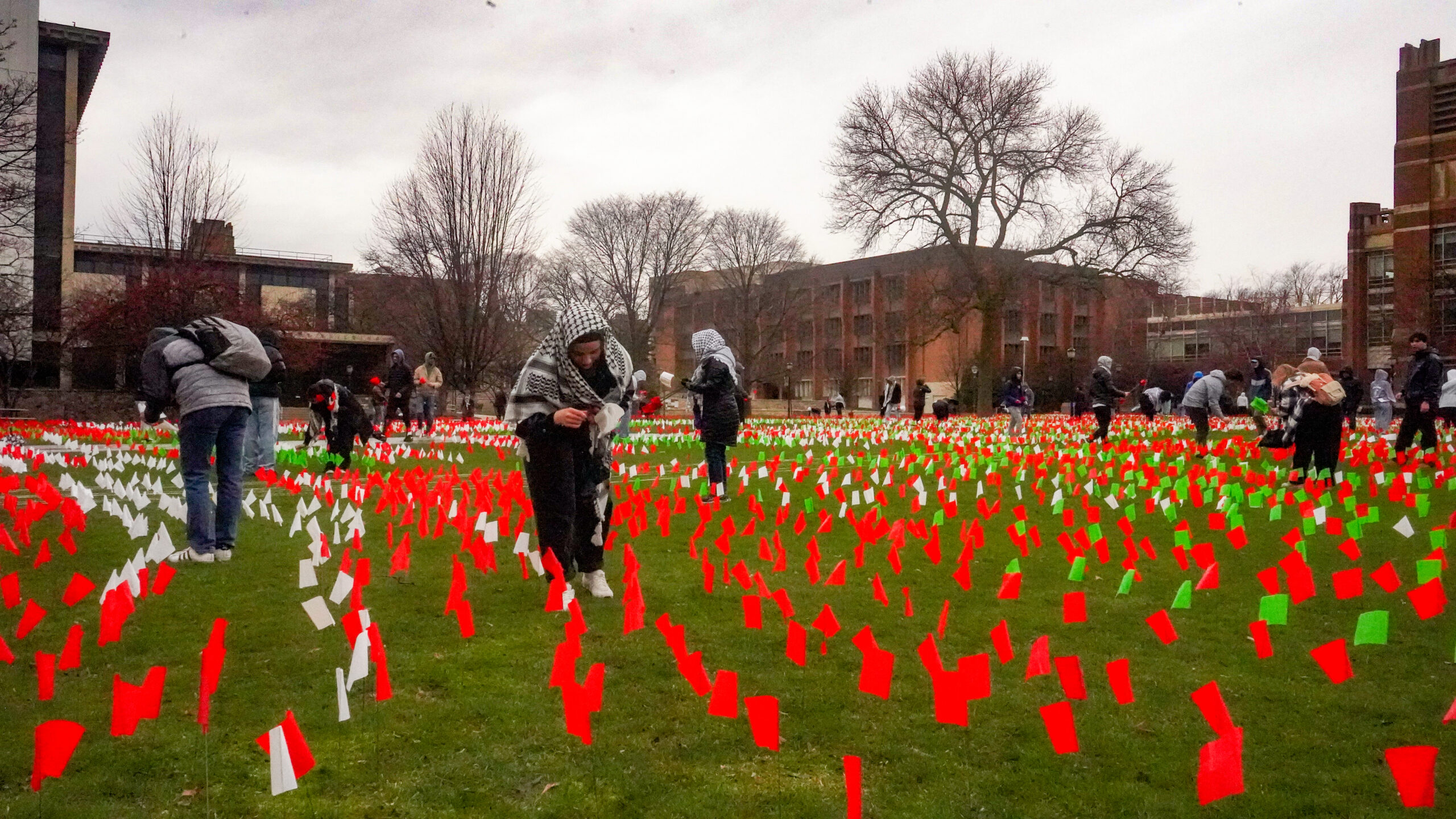
Raising awareness
Amani Dalieh, a junior, shivered early Sunday afternoon as she showed each newcomer where they could pick up flags. Rain drizzled under gray skies; the temperature did not yet reach 40 degrees.
Many of the students were fasting for Ramadan, a holy month in the Islam when Muslims do not eat or drink anything from pre-dawn until after sunset. Dalieh’s teeth chattered with cold.
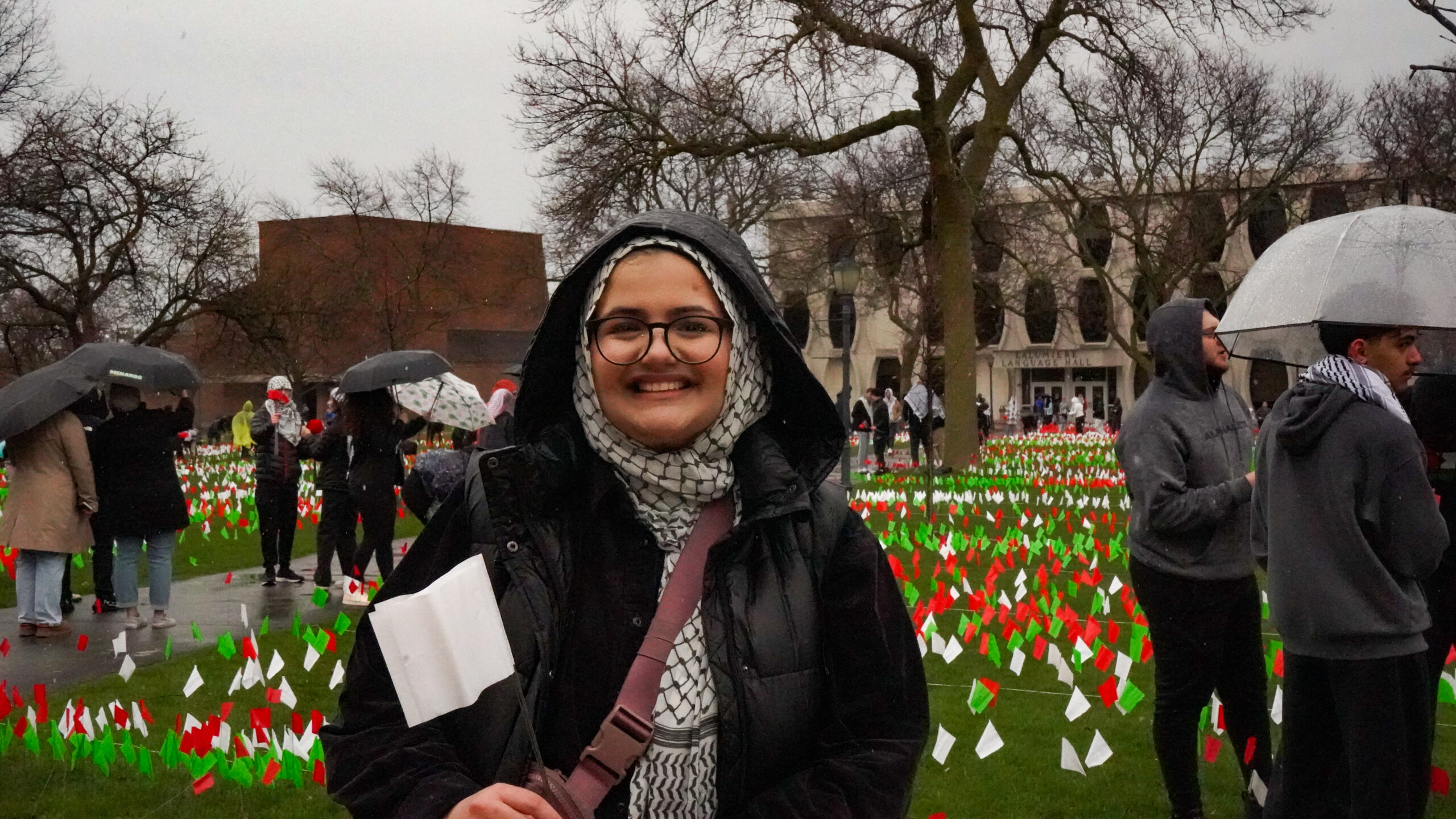
Amani Dalieh, president of Marquette University’s chapter of Students for Justice in Palestine, said MU’s Muslim Student Association collaborated in planning the flag-planting event.
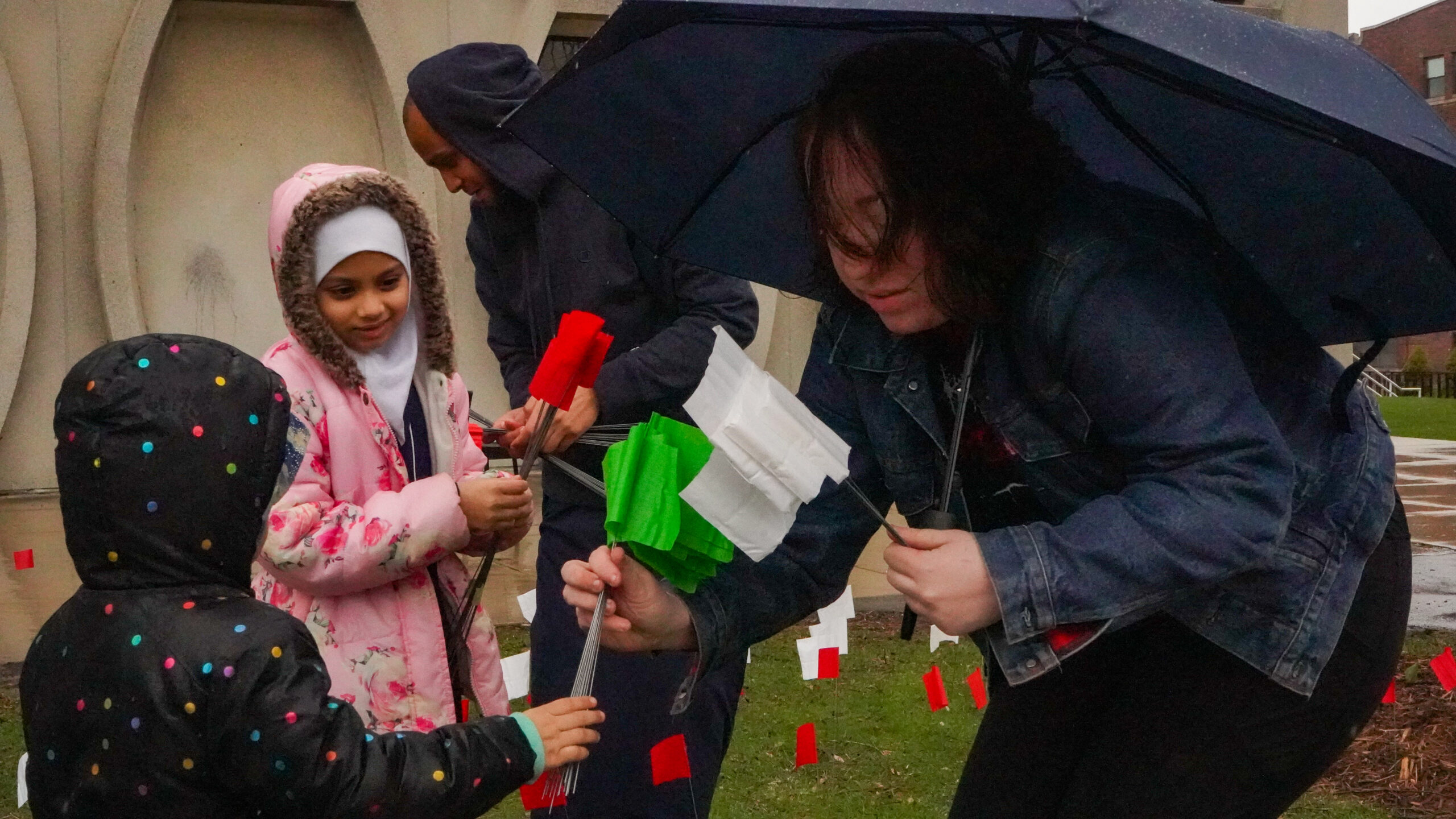
SJP president, and newly elected executive vice president of MU’s Student Government, Dalieh had arrived on campus at 10:30 a.m. to set up the mall for flag planting, along with 15 other students from SJP and MSA. They lined the green space with yarn mounted on small sticks and marked off rectangles for an orderly placement of flags. Some students unwrapped boxes of red, green and white flags.
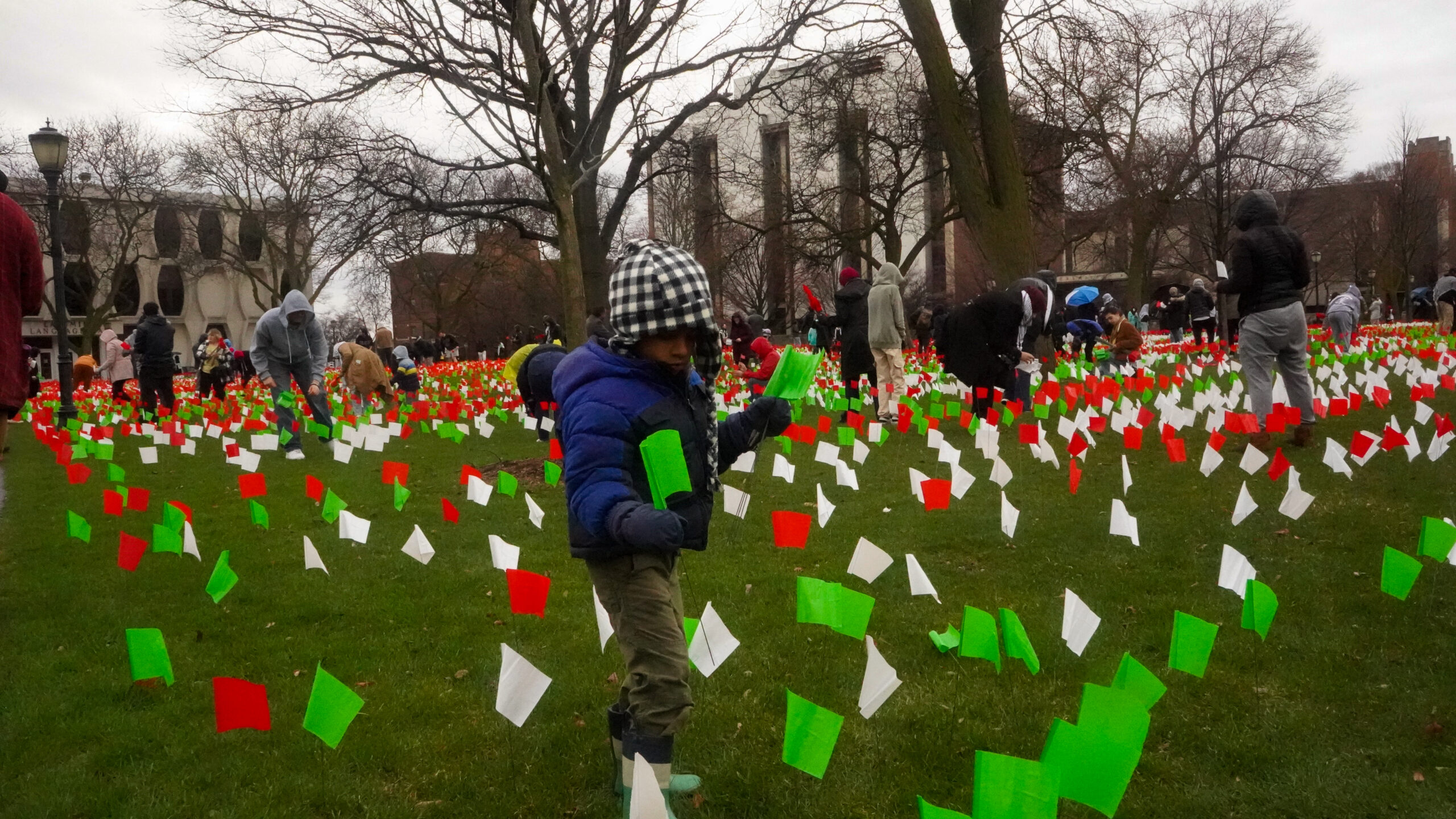
“Black flags weren’t available; otherwise, we would have made a Palestinian flag,” Anas Alzamli explained. He carried a bullhorn to direct participants to areas that needed more flags. Alzami is a Palestinian American student from Glendale Heights, Illinois, whose family is from Gaza.
“The biggest value of doing this is honoring the innocent lives lost in Palestine – the dreams, aspirations, everything that was in their lives, everything they wanted to do with their lives, all taken away in the blink of an eye for no good reason,” he said. “We are putting a flag for each martyr so when students walk by they are always aware that just because we are privileged enough to walk around in safety and eat or drink whenever we want, people in Gaza are not.
“This is an ongoing situation. This memorial is not is not for an anniversary of anything. This isn’t a two-year mark. People are starving as we speak. People are under rubble.”
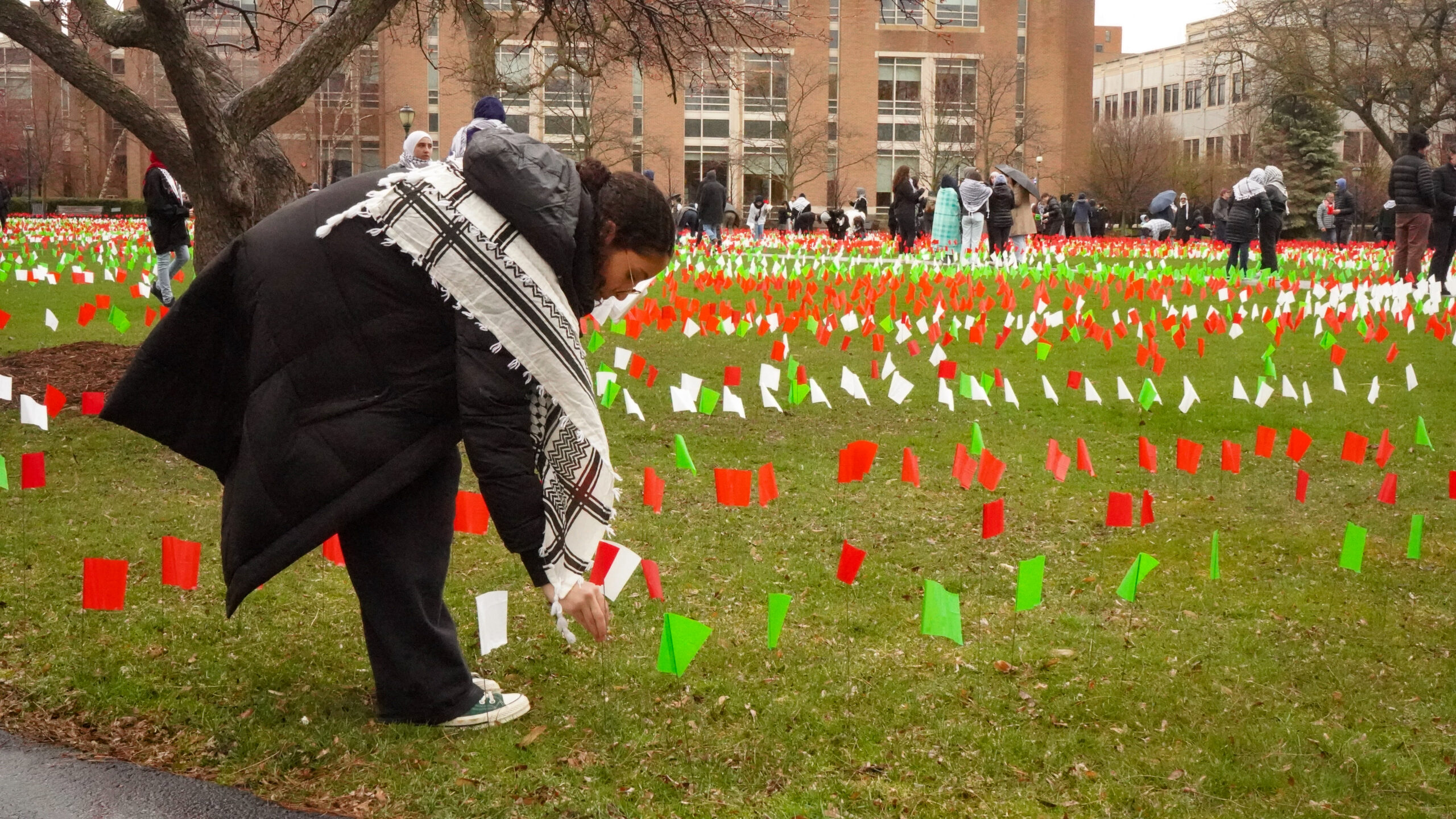
“I want everyone to never forget talking about Palestine,” said Yazeed Abushanab, an MU junior from Brookfield and president of the MSA. “This is something we have to talk about in order for change to happen.
“It is heartwarming to see students who are not direct members of the Muslim or Arab community showing their support. They wear keffiyehs (Palestinian scarves) and Palestinian bracelets and show up to events. At the end of the day, they are human beings. They have a heart and want to stand up and say something about what is going on.”
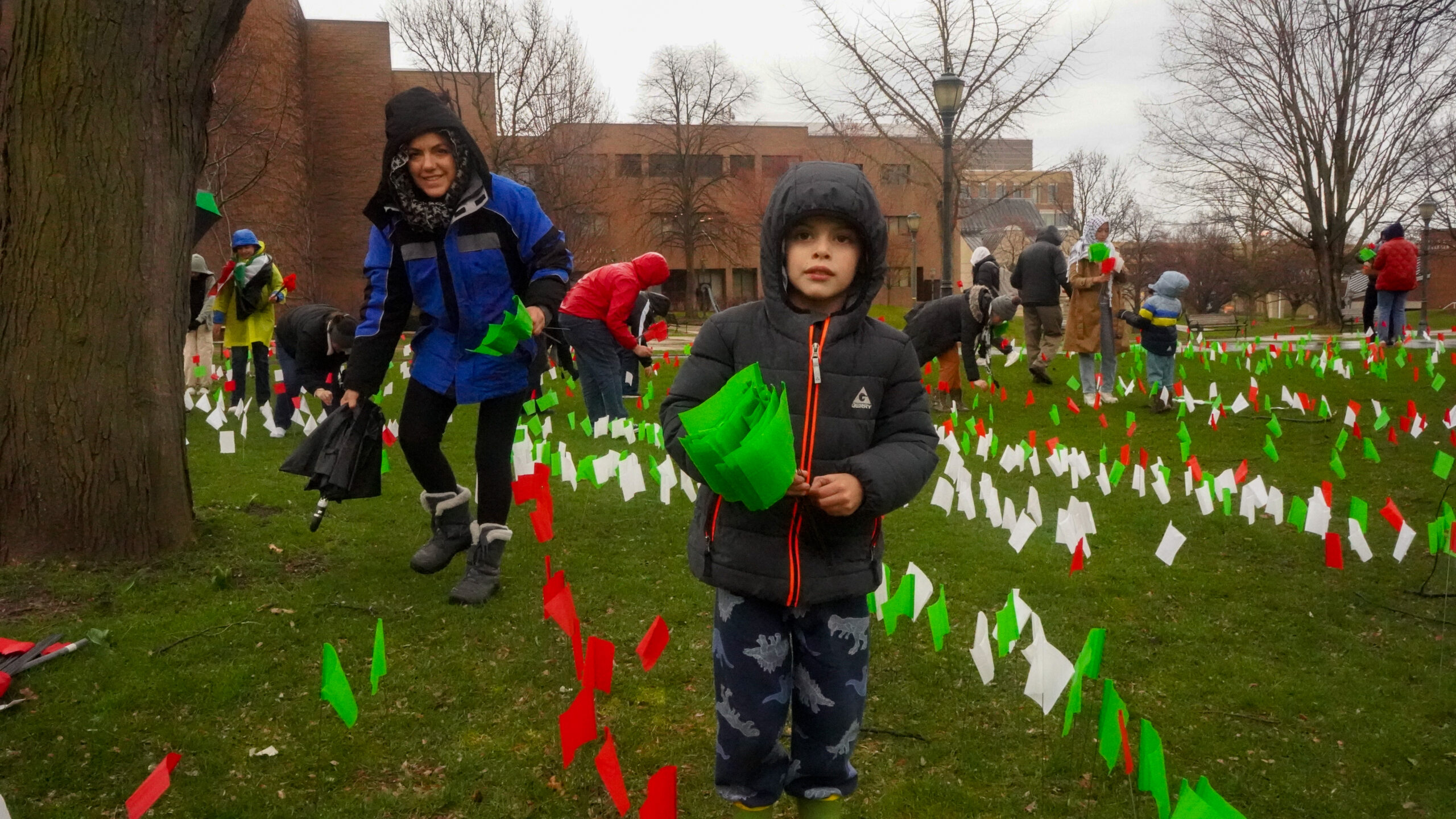
Honoring the dead
Mohammad Hamad and Heather Gilvary-Hamad of Brookfield honored specific people as they planted flags. Hamad made a list that includes 24 close relatives, including his sister, uncle and cousins, who have been killed in Gaza since Oct. 7.
“The list goes on,” Hamad said. “Friends, neighbors, teachers. It has been 184 days of grieving. We are a very small community (in Gaza). Everyone knows everyone. Every day brings news of more who have died.
“We are frustrated and angry,” he added. “We hope these events bring attention to what is happening. Hopefully, we will see changes in U.S. policies (that support the Israeli military).”
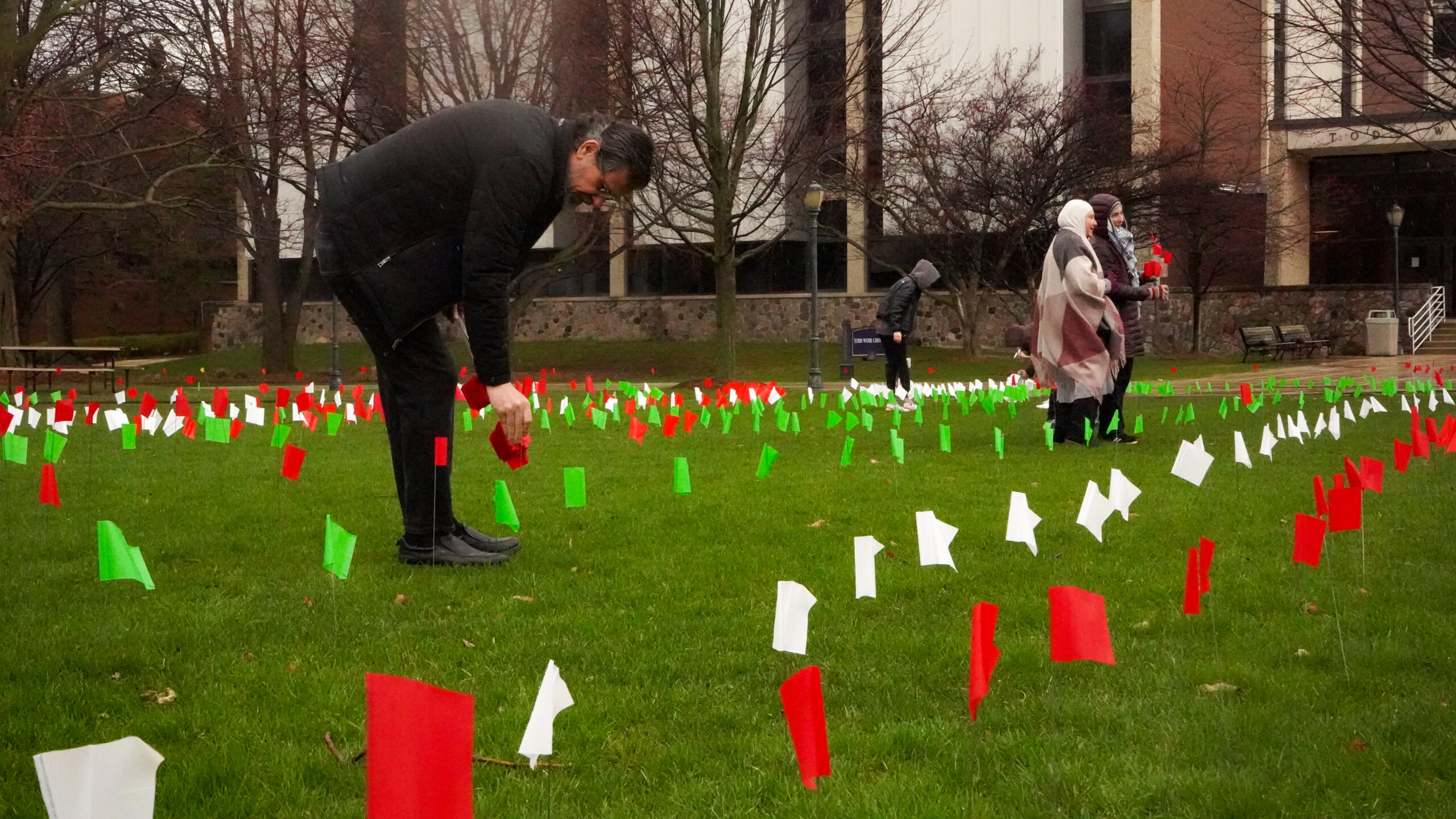
Mohammad Hamad of Brookfield planted flags to honor 24 close relatives, including his sister, who were killed in Gaza since Oct. 7.
Farouq Abukhamireh of Greendale heard about the event from his children who are MU students. “I’m here to express my solidarity with the people of Gaza and to protest the genocide that is going on there. I am also protesting the use of American taxpayers’ money to send weapons and high-tech machinery to Israel to be used to kill innocent people and children.”
Zeina Sahraoui of South Milwaukee and Serena Bekteshib of Chicago, both Marquette juniors, said what is happening in Gaza feels personal.
“I’m Tunisian, an Arab Muslim country,” Sahraoui explained. “Ever since I was young, I always heard about the Palestinian and Israeli conflict. My parents have been super vocal about it.”
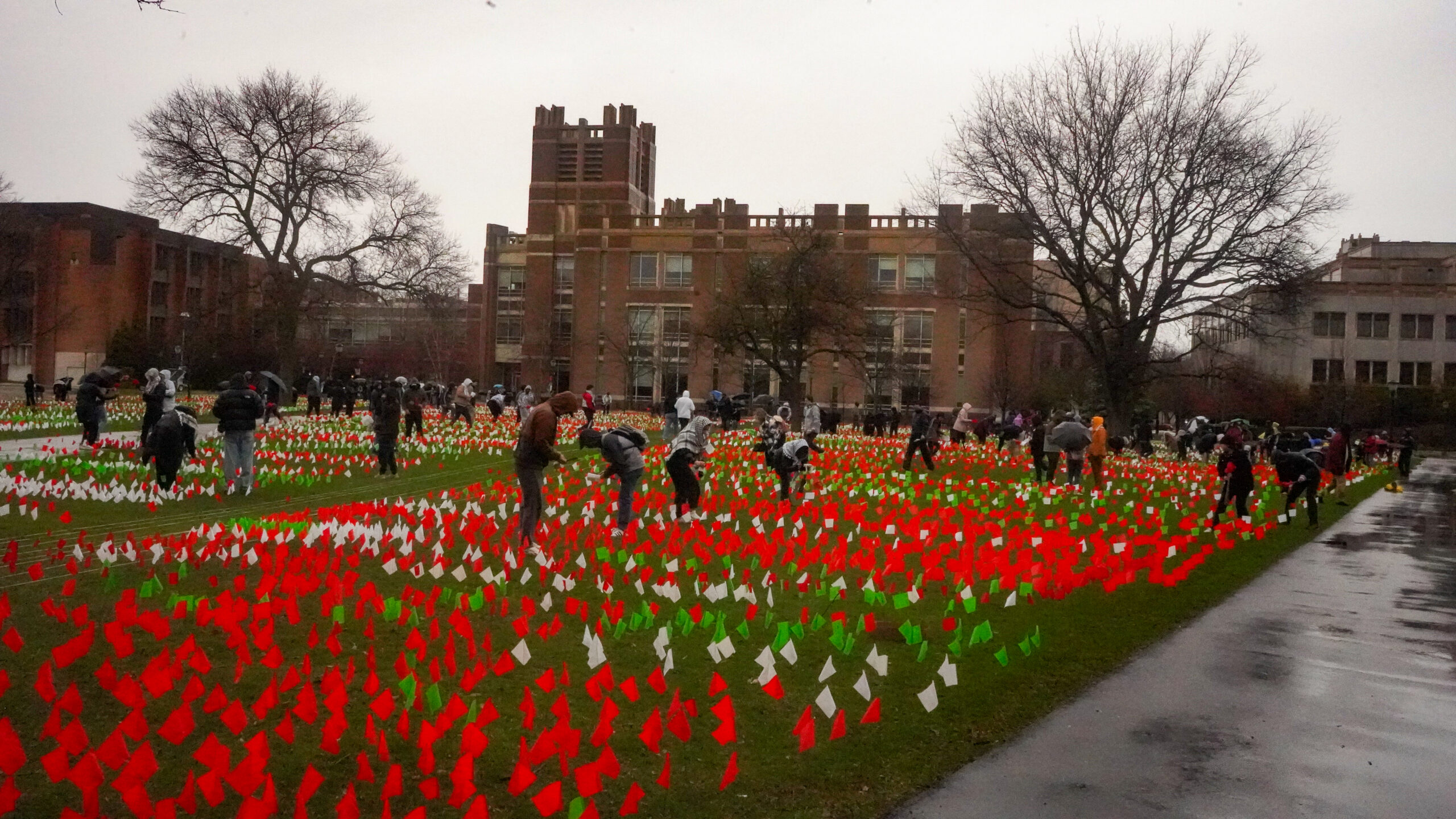
“I came here to support my Palestinian friends and family,” said Bekteshib, who is from an Albanian family. “I say ‘family’ meaning that I consider them my friends, my sisters and my brothers. I want to bring awareness to all the martyrs in Gaza and to teach others about Palestine.”
Both young women agreed that most of the support for the Palestinians they see comes from Muslim and Arab students. “I do see other American students sharing posts on social media about Palestine. I’d like to see them take it a step further.”
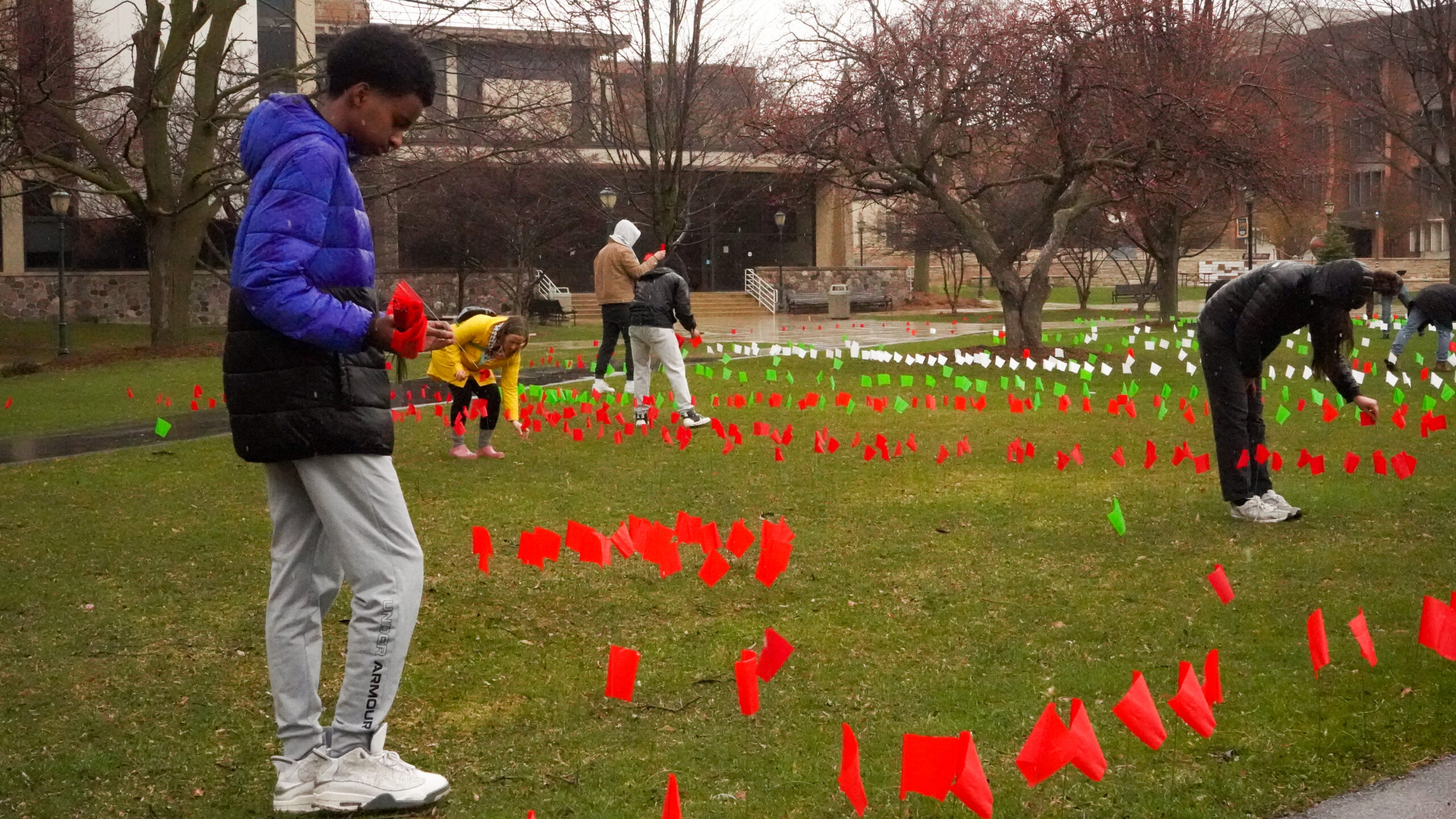
Elliot Russell, a sophomore from Chicago and a recent Muslim convert, said he was there “to support the community that’s had my back through everything. It’s not that it’s all Muslims that are being murdered in Gaza, though the majority are. My Palestinian friends have treated me like family. I feel it is only right for me to step forward for them.”
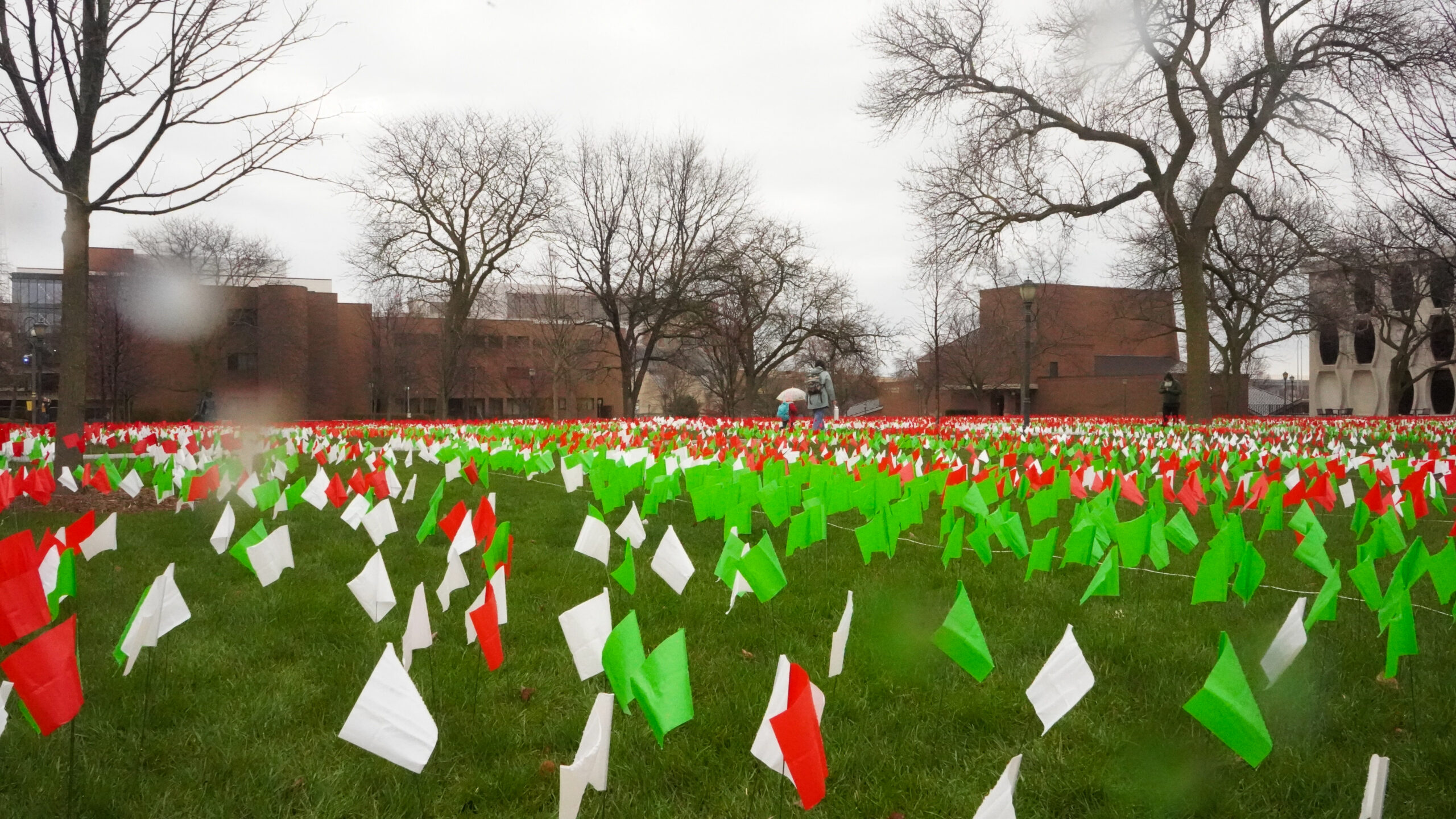
Justin Gronbach of Milwaukee learned about the event on social media. “I follow local groups (supporting Palestine) and journalists on the ground,” he said. “I’m a pacifist Orthodox Christian and I support humanity.” Gronbach visited the West Bank five years ago with a group from church that wanted to learn more about the situation, he said. Although they didn’t go to Gaza, they saw the discrimination Palestinians in Israel and the West Bank face, he said.
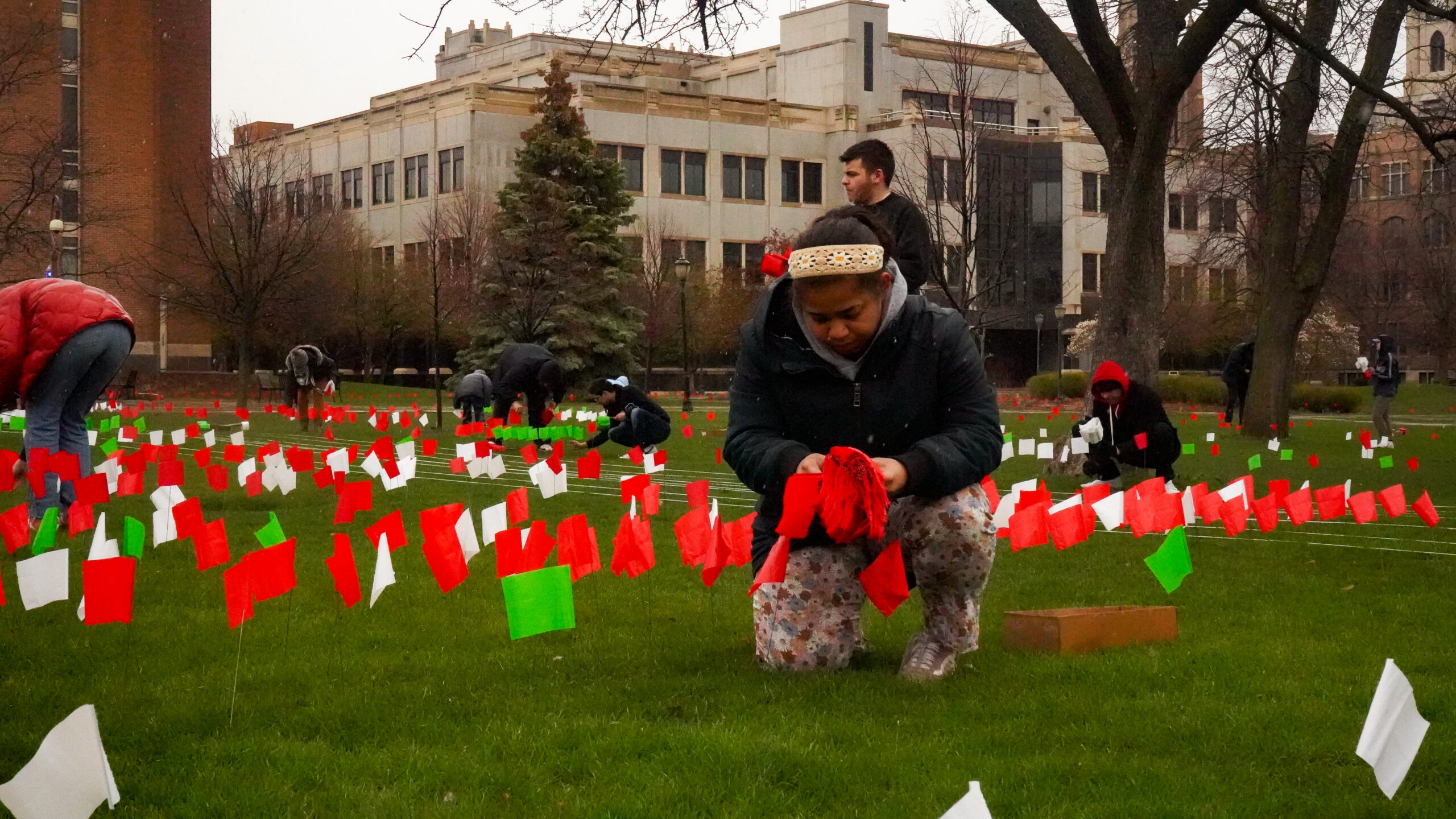
Demanding change
Islamic Society of Milwaukee president Salah Sarsour participated because “we need to do whatever it takes to stand with the families of Gaza and stop the genocide,” he said. The display of flags gives him hope, he added. “This young generation of students sympathize with the people of Gaza. They want the killing to stop and they want to give this message to the world.”
Janan Najeeb, executive director of the Milwaukee Muslim Women’s Coalition and convener of the Wisconsin Coalition for Justice in Palestine, a coalition of 64 diverse organizations, brought a message from WCJP, sent as press release before the planting. MU’s SJP is a member of the coalition.
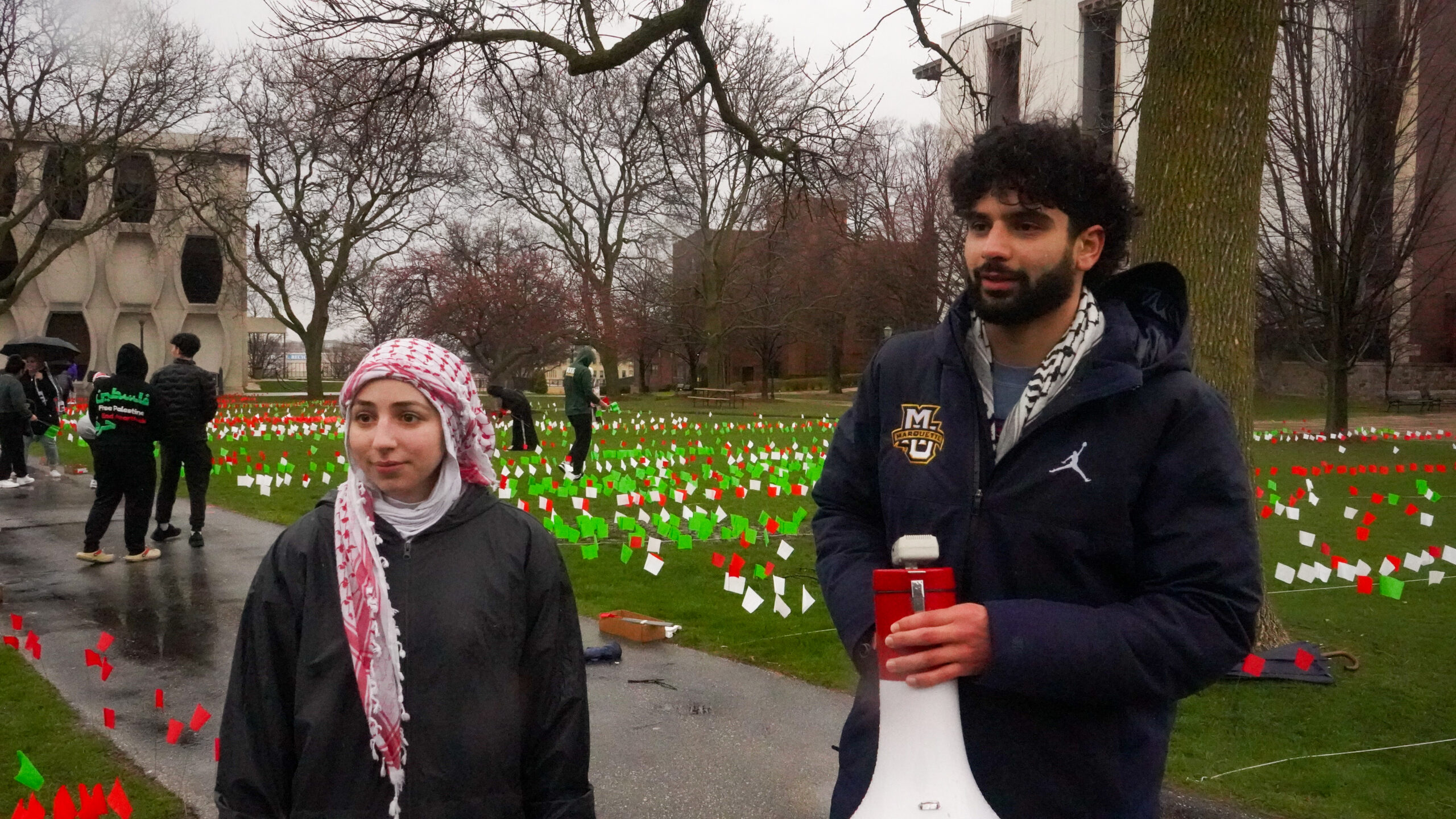
Leen Mortada and Anas Alzamli
“The WCJP supports the event: All Eyes on Gaza,” the press release states. “In spite of the genocide, death and destruction Israel and our complicit government have imposed on civilians trapped for decades in the Gaza concentration camp, the Palestinians of Gaza have opened the eyes of the world to the injustices they have faced for 76 years …
“Of particular concern is the complicity and support the Biden administration has had in this genocide. In total disregard of the U.N. Security Council demand for a ceasefire and ‘the urgent need to expand the flow’ of aid to the Palestinian civilians, the Biden administration is sending additional 2,000-pound bombs to be used on civilians.”
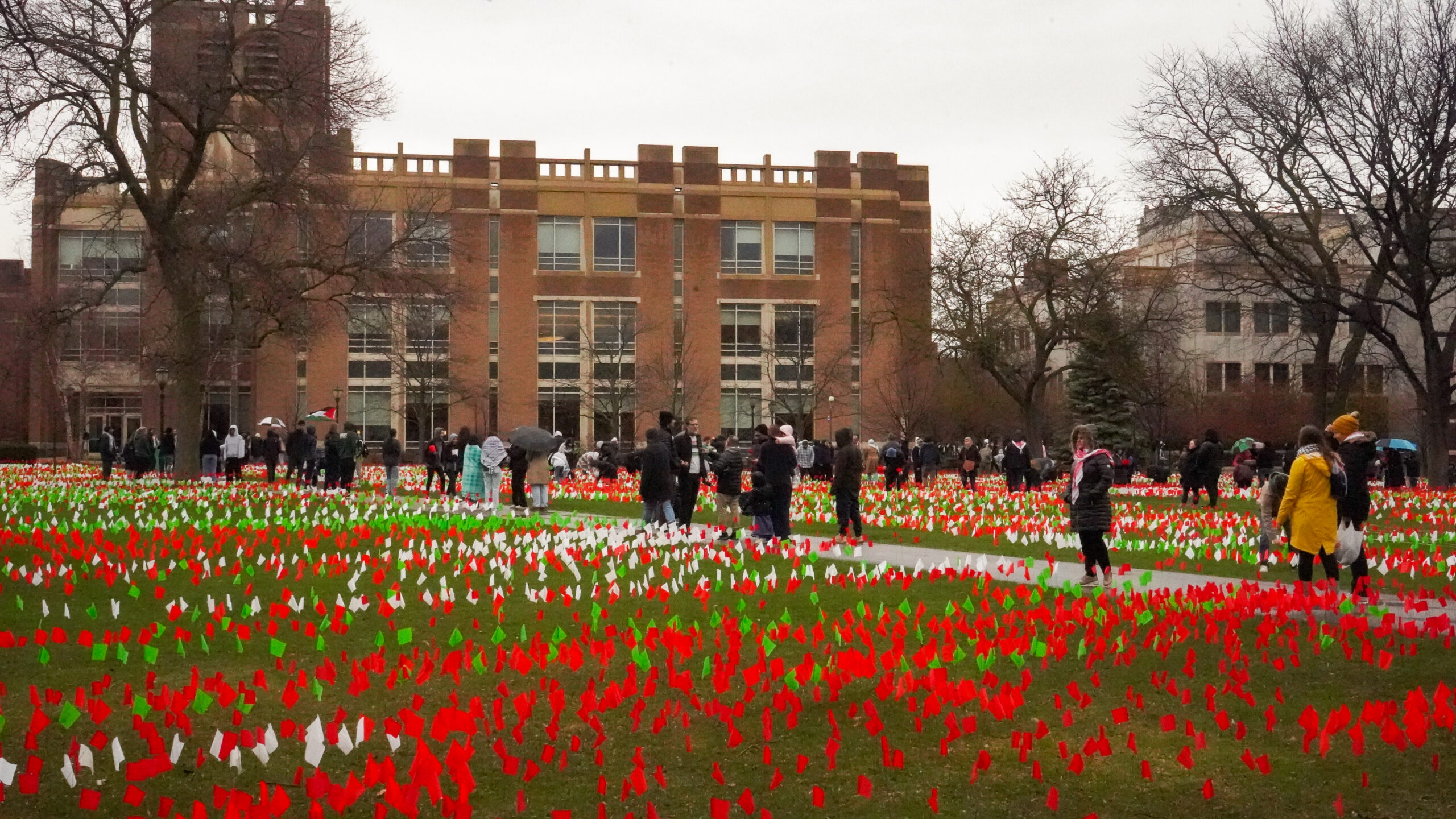
41,000 flags planted on the Marquette University campus represent the lives lost in Gaza in the past six months.
